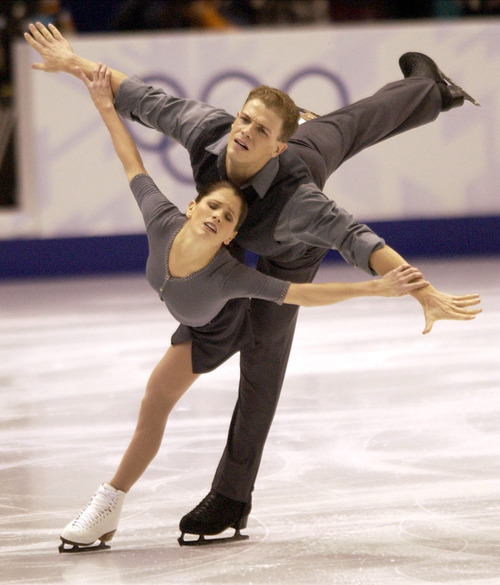This is an archived article that was published on sltrib.com in 2012, and information in the article may be outdated. It is provided only for personal research purposes and may not be reprinted.
Salt Lake City is poised to chase the Olympics again.
With the 10th anniversary of the 2002 Winter Games at hand, talk of another bid is circulating in the government and business circles that would have to come together to finance a multimillion-dollar campaign, most likely for the 2022 Olympics.
Gov. Gary Herbert told The Salt Lake Tribune last month that he had been involved in discussions about the idea. His spokeswoman, Ally Isom, said Friday "there are a lot of people who are interested in this, but there is nothing official to report."
Still, "our goal has always been to keep the ball in play in case another opportunity developed," said Jeff Robbins, president and CEO of the Utah Sports Commission, an agency created to attract national and international sporting events to the state.
Before a formal bid committee is assembled, a dispute must be resolved between the International Olympic Committee (IOC) and the U.S. Olympic Committee (USOC) over the distribution of revenues from television broadcast rights and global sponsorships.
Five hours of talks Friday in Austria between negotiators for the two sides — including former Salt Lake Organizing Committee executive Fraser Bullock as one of the key USOC representatives — made "good progress" toward ending the lengthy quarrel, according to The Associated Press.
But a deal was not reached yet, the AP said, and no date was set for the next round of talks.
Until that issue is settled, the USOC will not put forth an American city as a candidate to stage an Olympics, not wanting to repeat the debacle of the 2016 Summer Games selection process, in which Chicago finished last among four finalists.
That outcome was viewed widely as a sign that IOC members would not select a U.S. bid city until financial differences were put to rest.
The USOC already has passed up a chance to bid for the 2020 Summer Games. That makes the 2022 Winter Games the next possibility. The IOC will make that site selection in 2015.
For that bid, candidates must be submitted to the IOC in 2013. That means the USOC would have to make its selection months to a year earlier, maybe even later in 2012.
A Reno-Tahoe Winter Games Coalition has existed for years, eager to become "the next American region to host an Olympic Winter Games."
Denver also is investigating a bid. A 22-member exploratory committee, assembled by Colorado Gov. John Hickenlooper and Denver Mayor Michael Hancock, met for four hours Jan. 7 to consider the costs and benefits of staging the Olympics.
A number of factors could drive Salt Lake City's entry into the fray.
In tough economic times, returning to an existing Olympic host city could be a prudent use of resources.
One thing that has not changed since the successful staging of the 2002 Winter Games is that Salt Lake is a big city, with arenas, hotels and restaurants within an hour's drive on interstate highways of world-class competition venues.
"Clearly, we have the best venues in America, if not North America," said Spencer Eccles Jr., executive director of the Governor's Office of Economic Development, adding that all have been used extensively since 2002, a testimony to the state's commitment to becoming the country's winter sports capital.
If the USOC needs to advance a candidate quickly to meet the IOC deadline, a tested city with intact venues could develop an acceptable plan more quickly.
In addition, many people who worked on the 2002 Games — from SLOC executives to thousands of volunteers — would be available to take up the task again.
Bullock, for one, has been involved during the past decade with the USOC and IOC.
"That tells you we did some things well. They [USOC and IOC] look to us for guidance," said Eccles, whose father, Spence, was a driving force behind the 2002 Olympics. "We continue to be involved."
Getting the Games could help finance upgrades that will be needed at the Utah Olympic Park's complex of ski jumps and bobsled/luge track and the Olympic Speedskating Oval in Kearns.
The $76 million endowment SLOC left to fund operations at those facilities took a significant hit in the recession. It was down to $60.7 million at the end of September and is projected to run out by 2030.
Tapping sponsor money to keep those facilities in top-notch shape is important to the continued success of the U.S. Ski and Snowboard Team and U.S. Speedskating. Both are based in Utah and bring home the bulk of U.S. medals from the Winter Olympics.
By 2022, Salt Lake City will present a different face to the world than it had in 2002.
Downtown will be reshaped with this year's completion of the LDS Church-owned City Creek Center. Light-rail trains will be available to move people from highly accessible Salt Lake City International Airport to downtown as well as southern and western suburbs.
Park City's hotel scene also will have expanded significantly with the addition of the St. Regis, Waldorf-Astoria and Montage brands.
"We're better suited to host the Games now," Robbins said, "than we were then [in 2002]."
Twitter: @sltribmikeg —
The revenue dispute
The IOC wants a bigger cut of revenues. The USOC currently receives 20 percent of global sponsorship revenue and 12.75 percent of the money from U.S. broadcast rights. —
Upcoming Games
Summer
2012 • London
2016 • Rio de Janeiro
2020 • To be determined
Winter
2014 • Sochi, Russia
2018 • Pyeongchang, South Korea
2022 • Salt Lake City?



